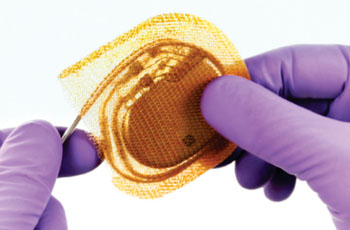Antibacterial Envelope Stabilizes Implantable Cardiac Devices
By HospiMedica International staff writers
Posted on 07 Oct 2014
An innovative absorbable mesh envelope covers an implantable cardiac device to help stabilize it after implantation and reduce surgical-site infections.Posted on 07 Oct 2014
The TYRX absorbable antibacterial envelope is intended for cardiac implantable electronic devices (CIEDs) such as a pacemaker, an implantable cardioverter defibrillator (ICD), or a cardiac resynchronization therapy (CRT) device. The envelope first stabilizes the CIED, then releases rifampin and minocycline to the surgical site to prevent infection, and finally dissolves and is fully absorbed approximately nine weeks after implantation.

Image: The TYRX absorbable antibacterial envelope (Photo courtesy of Medtronic).
In studies of the efficacy of the previous, non-absorbable TYRX antibacterial envelope, six-month follow-up data showed that patients who received an ICD or CRT replacement device with a TYRX antibacterial envelope experienced low infection rates of 0.2%, compared to 1.9% of patients who did not receive the envelope. The rate of device mechanical complications was also low (4%) in patients who received the envelope. The TYRX absorbable antibacterial envelope is a product of Medtronic (Minneapolis, MN, USA), and has received the European Community CE marking of approval.
“While the risk of infection is low for most patients receiving an implantable device, the TYRX envelope offers an extra layer of protection,” said John Liddicoat, MD, president of the cardiac rhythm and heart failure business and senior vice president of Medtronic. “The TYRX envelope provides physicians with a proven solution to make implantable device procedures safer for their patients.”
“The TYRX envelope seems to offer physicians a simple, yet highly effective method of reducing surgical-site infections, particularly among those high-risk patients who are undergoing a repeat procedure,” said Charles Kennergren, MD, PhD, of Sahlgrenska University Hospital (Gothenburg, Sweden), who performed the first implant of the envelope in Europe. “We have high expectations for this novel product, both in terms of reducing infection rates as well as avoiding device migrations.”
Minocycline and rifampin have been shown to provide a broad spectrum of activity against both antibiotic-sensitive and antibiotic-resistant bacteria, with the combination superior to vancomycin, clindamycin, novobiocin, or minocycline alone. In combination, they have been found to be more potent than a combination of chlorhexidine and silver sulfadiazine, and equivalent to ceftazidime or amphotericin B against gram negative bacilli and Candida albicans.
Related Links:
Medtronic














